by Naomi L. | August 16, 2017 | Blog, Creative Writing, Featured |
So you’ve just started writing fiction, but you’re not sure you’ve got what it takes. You’re afraid you’ll fail, that you’ll make a ton of writing mistakes and you’ll never be that amazing artist you hope to be someday. Or worse, maybe you think you’ll kill it as soon as you start, and your writing will be so awesome right out of the gate that you’ll never have to practice and improve (only to wonder years down the road why no one ever reads your incredible stories). Whether you suffer from imposter syndrome or unfounded arrogance, your expectations of writing are unreal.
Because guess what? Every writer makes mistakes! That’s how we learn and get better at our craft. But if you want to avoid learning some lessons the hard way (and I don’t blame you), it never hurts to turn to writing resources for help. So for all you blossoming writers out there, here are six common writing mistakes you’re bound to make at least once. Keep an eye out for these the next time you sit down to write!
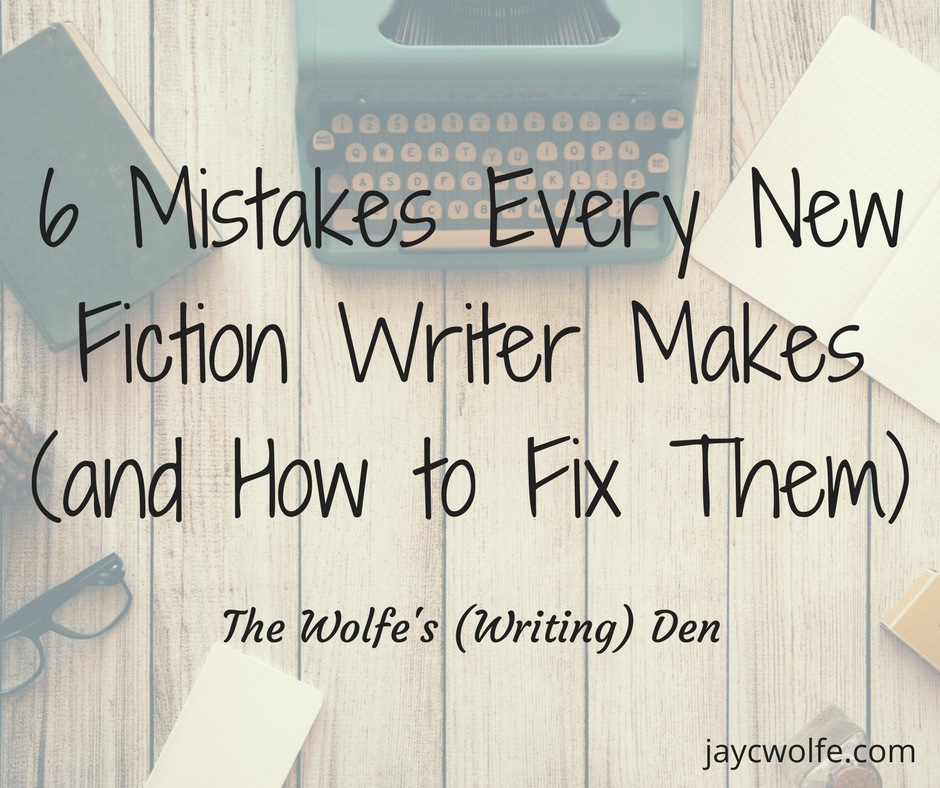
Writing Mistake #1: Stopping at the first draft (i.e. not editing)
The first draft of anything is sh*t. – Ernest Hemingway
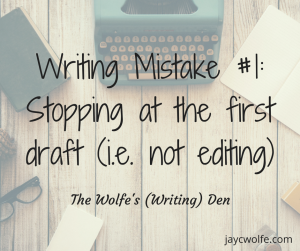 Let’s get this one out of the way first. A common mistake many new fiction writers make (including me when I started) is to write a full story, then set it aside and never touch it again. An important rule of fiction writing: Every piece must go through editing before it’s finished. To be fair, this isn’t as big a deal with private writing, but it’s still good practice for when you’re ready to start sharing your work.
Let’s get this one out of the way first. A common mistake many new fiction writers make (including me when I started) is to write a full story, then set it aside and never touch it again. An important rule of fiction writing: Every piece must go through editing before it’s finished. To be fair, this isn’t as big a deal with private writing, but it’s still good practice for when you’re ready to start sharing your work.
The truth is nothing you write is going to be perfect the first time around. Never assume you’ve created a masterpiece on your first try; even the greatest authors in the world need editors to help them shape their writing into publishable work. Heck, the blog post you’re reading now went through several rounds of revisions before I published it, and it still isn’t perfect!
So don’t stress about making something awesome right away. If anything, let this fact take away the pressure of having to write well all the time. Just write first, worry about making it publishable later. That’s what editing is for.
How to fix this writing mistake
Edit! Edit like your life depends on it, because your story’s life does. Readers don’t appreciate stories because they come out brilliant on the first try, but because the writer took the time to shape that first idea into a polished piece of art. Always make sure your work is worthy of publication before you share it. Need help? You don’t have to do it all alone; that’s what editors are paid for!
Writing Mistake #2: Using flowery language (i.e. purple prose)
Eschew surplusage. – Mark Twain, “Fenimore Cooper’s Literary Offenses” (1895)
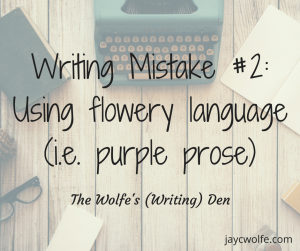 There’s this myth among beginning writers that the best way to be taken seriously is to sound as smart as possible. Maybe you’re insecure about your limited knowledge and vocabulary, so you stuff your stories with fancy words and fluffy sentences, then pat yourself on the back for creating distinguished and eloquent prose. Surely now you’ve proven yourself a great writer, right?
There’s this myth among beginning writers that the best way to be taken seriously is to sound as smart as possible. Maybe you’re insecure about your limited knowledge and vocabulary, so you stuff your stories with fancy words and fluffy sentences, then pat yourself on the back for creating distinguished and eloquent prose. Surely now you’ve proven yourself a great writer, right?
Wrong. While you may think all that fancy writing will give you credibility, you’ve actually just exposed yourself as an amateur. This common writing mistake is known as purple prose, and it can kill your story before it even starts. Counterintuitive as it sounds, using “smart” words and flowery language actually has the opposite effect of driving readers away, because the only people who waste their time reading stories they can’t understand are high school students trying to pass English. Everyone else wants a good story, not a vocabulary lesson.
Purple prose comes in a variety of flavors:
- big, difficult, pretentious words;
- flowery detail;
- too many adjectives and adverbs;
- said bookisms (only using words other than “said” as dialogue tags); and
- exaggerated sentiment (trying to “force” readers to feel certain emotions).
If you’re guilty of making any of these mistakes, stop and rewind. When you edit, make every effort to weed out the purple and strip your story down to the bare bones. You may have trouble getting used to this style, but in time you’ll find that concise and direct writing is the most effective form of storytelling.
How to fix this writing mistake
Replace big words and phrases with simpler ones, remove unnecessary adjectives, and cut out details that do nothing for your story. The idea is to sound as natural and direct as possible so you’ll connect with your readers. When in doubt, read your work out loud; if a word or phrase sounds strange, like something you’d never say in real life, delete it or replace it with a more common alternative.
Writing Mistake #3: Getting crazy with the punctuation!!!
Jake: Ok, I’m excited. I just don’t happen to like exclamation points.
Elaine: Well, you know, Jake, you should learn to use ’em! Like the way I’m talking right now, I would put exclamation points at the ends of all of these sentences! On this one! And on that one!
– Seinfeld (Season 5, Episode 4 – The Sniffing Accountant)
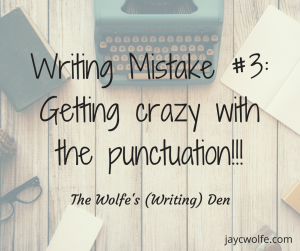 Of all the ridiculous situations in Seinfeld‘s nine-season run, few top the time Elaine screwed up her relationship over punctuation. The irony: her boyfriend was a writer whose book she was editing, and he was probably right not to use those exclamation points.
Of all the ridiculous situations in Seinfeld‘s nine-season run, few top the time Elaine screwed up her relationship over punctuation. The irony: her boyfriend was a writer whose book she was editing, and he was probably right not to use those exclamation points.
When writing fiction, punctuation is something you don’t want to mess up, because this mistake translates as lazy or incompetent writing. Trust me on this: As much as a scene calls for over-the-top excitement, you don’t need three exclamation points to get your point across. When you overuse punctuation, you’re conveying one of two messages to your reader:
- you don’t trust your writing enough to express emotion through words alone, or
- you don’t trust the reader to grasp the emotion in your words without help.
Either way, it doesn’t make you look good. Writers should always take care not to patronize their audience, and one of the easiest ways to do that is by using exclamation points and other punctuation marks where you don’t need them. That’s not to say you should avoid them altogether; you just shouldn’t use them as a crutch. Instead, trust your words to convey the right messages and emotion on their own. Remember that punctuation is simply an organizational tool; the focus should always be on your words.
How to fix this writing mistake
Stick to normal punctuation. Use exclamation points sparingly, avoid multiple punctuation, and know how to use commas, apostrophes, colons, semicolons, and hyphens correctly. When in doubt, turn your work over to a proofreader.
Writing Mistake #4: Writing dialogue that falls flat
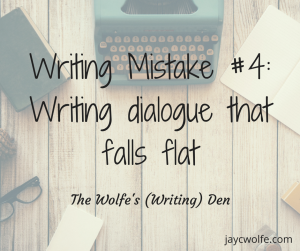 I confess: even after writing fiction for nearly my whole life, I still have trouble with dialogue. Maybe it’s because I’m shy and have little experience talking to people, but this seems to be my Achilles heel when it comes to writing stories. If you feel this is your weak point too, don’t worry, you’re not alone. In fact, dialogue is so hard to get right that this writing mistake could take up its own blog post, but for the sake of brevity, let’s focus on the main point.
I confess: even after writing fiction for nearly my whole life, I still have trouble with dialogue. Maybe it’s because I’m shy and have little experience talking to people, but this seems to be my Achilles heel when it comes to writing stories. If you feel this is your weak point too, don’t worry, you’re not alone. In fact, dialogue is so hard to get right that this writing mistake could take up its own blog post, but for the sake of brevity, let’s focus on the main point.
In a nutshell, dialogue is difficult to write well because it’s not quite speech and not quite narrative, but instead constitutes a class of its own. We think differently when we speak than when we write, so it takes a lot of practice to master the balance between both. Writing good dialogue involves removing the boring parts of everyday speech—pauses, ums, stutters, etc.—and refining it to a form that reads naturally while still conveying information relevant to the story. And while this may sound simple on the surface, it can take years of practice to learn how to:
- cut out the unnecessary parts of speech,
- make characters sound natural,
- give each character a distinct voice, and
- use a conversation to move the story forward.
So don’t feel bad if you’ve been writing for a long time and still struggle with this technique. Just keep practicing, and you’ll be writing good dialogue before you know it.
How to fix this writing mistake
Read your dialogue out loud and see how believable it sounds. If a phrase or sentence sounds odd, try to rephrase it in a way that a real person with your character’s background would say it. If you find this difficult, start paying attention to how people talk and incorporate more of their speaking styles into your writing (but not too much!). Condense dialogue as much as possible and make sure it always moves the story forward.
Writing Mistake #5: Telling more than showing
Don’t tell me the moon is shining; show me the glint of light on broken glass. – Anton Chekhov
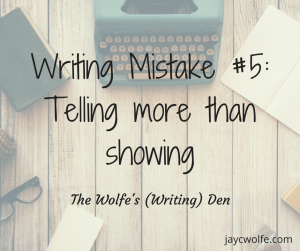 From creative writing courses to author blogs, we see this writing advice everywhere: show, don’t tell. This means that instead of outright stating a fact, you should give clues that help your readers figure the fact out for themselves. This technique is designed to create an immersive and engaging experience for your readers, and will often make the difference between a good narrative and a great story.
From creative writing courses to author blogs, we see this writing advice everywhere: show, don’t tell. This means that instead of outright stating a fact, you should give clues that help your readers figure the fact out for themselves. This technique is designed to create an immersive and engaging experience for your readers, and will often make the difference between a good narrative and a great story.
Granted, there will be times when telling is necessary because showing is impossible—such as telling exactly what a character is thinking or how an event has changed them internally—but conveying a simple idea or action in vivid imagery will add emotion and depth to your story. Instead of focusing on the idea itself, understand what makes that idea apparent and use those details to color the narrative. If a character is sad, describe the tears on her face or the way she hangs her head when someone talks to her. If it’s raining, describe your character hopping over puddles as he runs to the bus stop under a wet umbrella. Wherever possible, set the scene and let your audience fill in the blanks.
Good storytelling is not just telling people a story but bringing them on an emotional journey with you. So the next time you feel compelled to tell readers what’s going on, take a step back and assess how much you should tell and how much you can show instead. Master this balance and you’ll be one step closer to writing truly amazing stories!
How to fix this writing mistake
Read your story back and determine where the narrative falls flat. Highlight the passages that tell you something (e.g. “she was happy”, “it was a clear day”), then rewrite them in a way that will show you the same thing (e.g. “her laughter rose above the din”, “sunlight gleamed off the surface of the water”). Read through the story again and maintain the changes that make the narrative stronger.
Writing Mistake #6: Not writing!
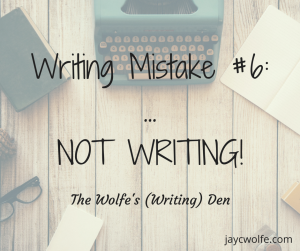 Yes, believe it or not, this is a common problem for beginning and advanced writers alike: not writing. Sounds counterintuitive, right? I mean, how can you be a writer if you don’t write?
Yes, believe it or not, this is a common problem for beginning and advanced writers alike: not writing. Sounds counterintuitive, right? I mean, how can you be a writer if you don’t write?
That’s just it: you can’t. But too many writers get so caught up in brainstorming, researching, self-editing, and worrying their work isn’t good enough that they don’t set aside enough time to actually write. It should go without saying that writing is the most important part of… well, writing, but most of the time, it’s just not that easy. When you sit for too long without doing any work, you succumb to deep-seated fears of failure and rejection, and before you know it, you stop writing before you even start.
So if you find yourself stuck in writing limbo, do yourself a favor and close your mind off to all your fears. Don’t stress about any of the other aspects of writing; just sit down and write. I know this is much easier said than done (speaking from experience), but once you get those words flowing, everything else will start to fall into place. Remember, unless you actually write, all those other steps are just a waste of time. Don’t be an “aspiring writer”; get out there and write!
How to fix this writing mistake
Write! Don’t worry about researching or editing or publishing or dealing with criticism yet. Just write. The rest will follow.
What about you? Are you guilty of making these writing mistakes? What other mistakes would you add to this list?
by Naomi L. | July 26, 2017 | Blog, Creative Writing |
Remember that list I shared a while back of wordy phrases you should edit out of your writing? Well, there’s a lot more where those came from! The Clarity game in the Elevate – Brain Training app is full of long and passive phrases that can easily be reduced to single, clearer words. It never hurts to learn how to simplify as many as you can!
So for your reference, here are 16 more wordy phrases you should simplify when editing your writing. Enjoy!
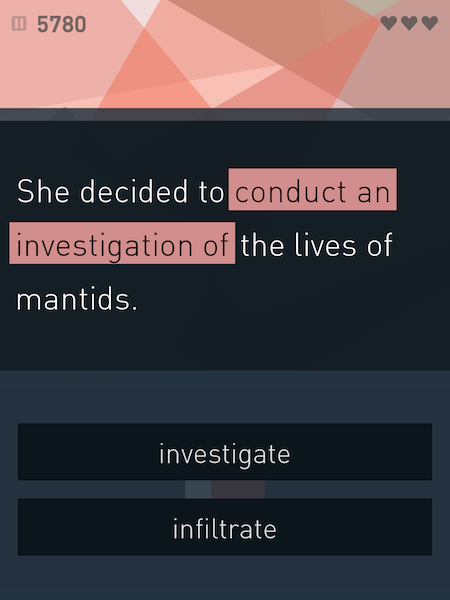 1) Able to: indicates that someone has the ability to do something. Simplify “able to” to “can”.
1) Able to: indicates that someone has the ability to do something. Simplify “able to” to “can”.
2) An adequate number of: a long phrase referring to an appropriate amount of something. Simplify “an adequate number of” to “enough”.
3) An appreciable number of: indicates a large amount of something. Simplify “an appreciable number of” to “several”.
4) An estimated: indicates an approximate number of something. Simplify “an estimated” to “about”.
5) By reason: refers to why something happened. Simplify “by reason” to “because”.
6) Conduct an investigation: passive form of the verb “investigate”. Simplify “conduct an investigation” to “investigate”.
7) Extend an invitation to: passive form of the verb “invite”. Simplify “extend an invitation to” to “invite”.
8) Have an adverse effect on: passive phrase meaning to produce an undesirable outcome. Simplify “have an adverse effect on” to “set back”.
9) In addition to: passive phrase indicating something extra. Simplify “in addition to” to “besides”.
10) In anticipation of: passive phrase referring to something done prior to an event. Simplify “in anticipation of” to “before”.
11) In connection with: a longer way to say concerning. Simplify “in connection with” to “about”.
12) It is crucial that you: a long phrase indicating something that is imperative. Simplify “it is crucial that you” to “you must”.
13) Made a statement that: lengthy phrase indicating that someone conveyed information. Simplify “made a statement that” to “said”.
14) Make reference to: passive phrase that indicates something being referenced. Simplify “make reference to” to “reference”.
15) Point of view: indicates how someone interprets a situation. Simplify “point of view” to “perspective”.
16) Realize a savings of: lengthy phrase that indicates an amount saved. Simplify “realize a savings of” to “save”.
Are you guilty of using any of these phrases? What other wordy phrases would you add to this list?
by Naomi L. | June 28, 2017 | Blog, Creative Writing, Featured |
Anyone who either is or has worked with an editor has had to deal with the common writing issue of active voice vs. passive voice. Any and every editor worth their salt will tell you to favor active voice, while writing in passive voice is just another bad habit you’ll have to learn to break. But why? What is active voice and what makes it so much better than its passive counterpart?

Finally, a fun way to check for passive voice!
(Image source: Grammarly Blog)
In a nutshell, an active voice sentence is when the subject does an action to the object, while passive voice is when the subject has an action done to it by the object. Both voices can be used to convey the same message, yet writing tips often advise favoring the former over the latter. This is especially true for fiction, which relies heavily on not only keeping readers engaged for an entire story, but evoking their emotions as you guide them through the world of your narrative.
So to help you create stronger and more appealing fiction, here are three reasons you should favor active over passive voice. Good luck!
1) Active voice is clearer, stronger, and more concise.

The longer you’ve been writing, the more you appreciate concise and direct language. In this modern-day barrage of knowledge, information that’s delivered and processed quickly tends to have a greater impact, so the fewer words you can use to convey a message, the better. One way to achieve this is by replacing passive voice statements with their active counterparts. Observe the difference:
Active: She loved him, but he rejected her.
Passive: He was loved by her, but she was rejected by him.
Notice how the active voice sentence is simpler yet much more powerful. Written concisely, the feelings of love and rejection between these characters become prominent and impactful, whereas the longer sentence appears convoluted and awkward, despite having the same meaning. By using fewer words, you can keep your writing direct and make your narrative stronger, which will result in more effective prose. Why let it be done by you when you can just do it?
2) Active voice sounds more natural.
Think about your favorite story, that book you enjoy so much you could read it over and over. Now think about why you love it. If “it speaks to me” is one of the first reasons to come to mind, then you’ve just made an excellent point to support active voice.
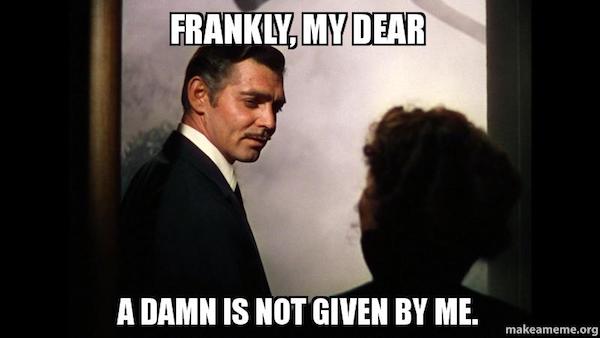
The types of writing that most resonate with us are the ones that sound familiar, that is, that mimic the way we speak. Active voice achieves this far more easily than passive voice because most of our speech is active. For example, when bragging to someone about an achievement, you wouldn’t tell them, “That was done by me”; you would say, “I did that!” Similarly, narrative should be as direct and “active” as spoken words. You want to draw your readers in and keep them hooked to the last word, and what better way to achieve that than by speaking directly to them?
3) Active voice keeps the momentum going.
One of the keys to good storytelling is to always keep the action moving forward. Even slower descriptive scenes should read smoothly, with new and relevant information in every line. Passive voice makes this difficult, as it has a way of dragging the pace of a story with unnecessary words and phrases. Don’t give your readers a motive to put your book down!
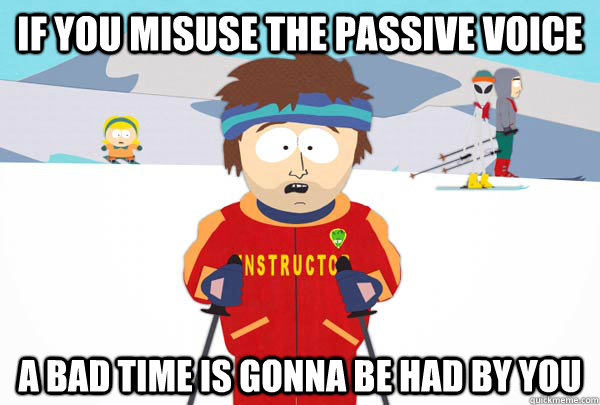
You don’t want your readers to have a bad time, do you?
Keep your prose clean by limiting passive voice to the few instances in which it works best:
- when you can’t say who performed the action;
- when you want to emphasize the action itself; and
- when you’re highlighting a general truth.
In all other cases, active voice will better maintain the momentum in your narrative, keeping your readers engaged through each new action until the end of the story. A good example of why this works is the Hero’s Journey: the hero answers the call to adventure, faces trials, confronts a great ordeal, collects the reward, and returns from his or her quest a new person. At every stage, the hero does something that leads to something else, standard cause and effect that propels the action forward. Apply this technique to your prose and the active voice will accomplish its most important goal: to make your writing active and interesting!
Perhaps you tend to overuse the passive voice without realizing (I know I’m still guilty of this), but luckily it’s an easy problem to fix. So the next time you edit one of your stories, keep an eye out for unnecessary passive sentences and replace them with their active parallels. Your readers will appreciate the effort!
What are your thoughts on active and passive voice? Are you guilty of not using active voice as frequently as you should?
by Naomi L. | May 17, 2017 | Blog, Creative Writing |
Remember that list of redundant phrases I shared on my blog a few weeks ago? Well, here are some more examples of phrases collected from the Elevate – Brain Training app that should be edited for brevity. Sometimes it seems like we never run out of these common redundancies, doesn’t it? One of the many reasons editing will always be a necessity for writers!
So for your reference, here are 14 more redundant phrases you should simplify during your editing phase. Enjoy!

Edit to: “If you buy one shirt, you’ll get another free.”
1) Absolutely crucial: Crucial already implies that something is absolutely important. Simplify “absolutely crucial” to “crucial”.
2) Added bonus: Bonus indicates something extra, making the word “added” unnecessary. Simplify “added bonus” to “bonus”.
3) ATM machine: ATM stands for “automated teller machine”, so the word “machine” is redundant. Simplify “ATM machine” to “ATM”.
4) Circle around: To circle already means to move all the way around something. Simplify “circle around” to “circle”.
5) Close proximity: Proximity already means the state of being close. Simplify “close proximity” to “proximity”.
6) First introduced: Introduced already indicates something that was seen or shown for the first time. Simplify “first introduced” to “introduced”.
7) For free: Free by itself means no charge, so the preposition “for” is unnecessary. Simplify “for free” to “free”.
8) Honest truth: Both the words “honest” and “truth” indicate an adherence to facts and reality. Simplify “honest truth” to “truth”.
9) Necessary prerequisite: A prerequisite, by definition, is a requirement, so the word “necessary” is redundant. Simplify “necessary prerequisite” to “prerequisite”.
10) New discovery: Discovery already implies that a finding is new. Simplify “new discovery” to “discovery”.
11) Temper tantrum: A tantrum is an outburst of anger, so the word “temper” (in the sense “an angry state of mind”) is redundant. Simplify “temper tantrum” to “tantrum”.
12) Temporary reprieve: A reprieve is short-term relief from something unpleasant, so the word “temporary” is unnecessary. Simplify “temporary reprieve” to “reprieve”.
13) Various differences: Differences are ways in which things vary, making the word “various” redundant. Simplify “various differences” to “differences”.
14) Visible to the eye: Visible already means able to be seen with the eyes. Simplify “visible to the eye” to “visible”.
Do you use any of these redundant phrases in your writing? What others would you add to this list?
by Naomi L. | April 26, 2017 | Blog, Creative Writing |
A couple of weeks ago, I shared a list taken from the Elevate – Brain Training app of common phrases that are unnecessarily wordy and should be edited out of most writers’ first drafts. Continuing on that theme, today I’d like to share another list of phrases from a similar Elevate game, Brevity, this time of redundant phrases that should be simplified for conciseness. Redundancy is another common plague of first drafts, so you can never know too many tips for making your writing as clear and concise as possible!
So for your reference, here are 16 redundant phrases you should simplify while editing your writing. Enjoy!
 1) Empty space: Space, by definition, is an unoccupied area, so the word “empty” is redundant. Simplify “empty space” to “space”.
1) Empty space: Space, by definition, is an unoccupied area, so the word “empty” is redundant. Simplify “empty space” to “space”.
2) Evil fiend/villain: The word “fiend” or “villain” already implies said person is evil. Simplify “evil fiend” to “fiend” or “evil villain” to “villain”.
3) First and foremost: An unnecessarily long phrase to indicate something that is most important. Simplify “first and foremost” to “first”.
4) Follow after: To follow already means to go or come after someone or something. Simplify “follow after” to “follow”.
5) HIV virus: HIV stands for “human immunodeficiency virus”, so the word “virus” is redundant. Simplify “HIV virus” to “HIV”.
6) In order to: A longer and less direct way of saying “to”. Simplify “in order to” to “to”.
7) Join together: To join means to connect two things to each other, making the word “together” redundant. Simplify “join together” to “join”.
8) None at all: None, by definition, means not any, so the phrase “at all” is unnecessary. Simplify “none at all” to “none”.
9) LCD display: LCD stands for “liquid crystal display”, so the word “display” is redundant. Simplify “LCD display” to “LCD”.
10) Might possibly: Both “might” and “possibly” indicate uncertainty of an event taking place. Simplify “might possibly” to “might”.
11) Past experience: Experience already indicates knowledge gained in the past. Simplify “past experience” to “experience”.
12) Please RSVP: RSVP stands for the French expression “répondez s’il vous plaît”, or “please reply” in English, making the word “please” redundant. Simplify “please RSVP” to “RSVP”.
13) PIN number: PIN stands for “personal identification number”, so the word “number” is redundant. Simplify “PIN number” to “PIN”.
14) Terrible disaster: A disaster is an event that causes great damage, making the adjective “terrible” unnecessary. Simplify “terrible disaster” to “disaster”.
15) Totally destroyed: To be destroyed is to be completely ruined, so the adverb “totally” is unneeded. Simplify “totally destroyed” to “destroyed”.
16) Unsolved mystery: A mystery is already an unexplained or unsolved event. Simplify “unsolved mystery” to “mystery”.
Are you guilty of using any of these phrases in your writing? What other redundant phrases would you add to this list?

 Let’s get this one out of the way first. A common mistake many new fiction writers make (including me when I started) is to write a full story, then set it aside and never touch it again. An important rule of fiction writing: Every piece must go through editing before it’s finished. To be fair, this isn’t as big a deal with private writing, but it’s still good practice for when you’re ready to start sharing your work.
Let’s get this one out of the way first. A common mistake many new fiction writers make (including me when I started) is to write a full story, then set it aside and never touch it again. An important rule of fiction writing: Every piece must go through editing before it’s finished. To be fair, this isn’t as big a deal with private writing, but it’s still good practice for when you’re ready to start sharing your work. There’s this myth among beginning writers that the best way to be taken seriously is to sound as smart as possible. Maybe you’re insecure about your limited knowledge and vocabulary, so you stuff your stories with fancy words and fluffy sentences, then pat yourself on the back for creating distinguished and eloquent prose. Surely now you’ve proven yourself a great writer, right?
There’s this myth among beginning writers that the best way to be taken seriously is to sound as smart as possible. Maybe you’re insecure about your limited knowledge and vocabulary, so you stuff your stories with fancy words and fluffy sentences, then pat yourself on the back for creating distinguished and eloquent prose. Surely now you’ve proven yourself a great writer, right? Of all the ridiculous situations in Seinfeld‘s nine-season run, few top the time Elaine screwed up her relationship over punctuation. The irony: her boyfriend was a writer whose book she was editing, and he was probably right not to use those exclamation points.
Of all the ridiculous situations in Seinfeld‘s nine-season run, few top the time Elaine screwed up her relationship over punctuation. The irony: her boyfriend was a writer whose book she was editing, and he was probably right not to use those exclamation points. I confess: even after writing fiction for nearly my whole life, I still have trouble with dialogue. Maybe it’s because I’m shy and have little experience talking to people, but this seems to be my Achilles heel when it comes to writing stories. If you feel this is your weak point too, don’t worry, you’re not alone. In fact, dialogue is so hard to get right that this writing mistake could take up its own blog post, but for the sake of brevity, let’s focus on the main point.
I confess: even after writing fiction for nearly my whole life, I still have trouble with dialogue. Maybe it’s because I’m shy and have little experience talking to people, but this seems to be my Achilles heel when it comes to writing stories. If you feel this is your weak point too, don’t worry, you’re not alone. In fact, dialogue is so hard to get right that this writing mistake could take up its own blog post, but for the sake of brevity, let’s focus on the main point. From creative writing courses to author blogs, we see this writing advice everywhere: show, don’t tell. This means that instead of outright stating a fact, you should give clues that help your readers figure the fact out for themselves. This technique is designed to create an immersive and engaging experience for your readers, and will often make the difference between a good narrative and a great story.
From creative writing courses to author blogs, we see this writing advice everywhere: show, don’t tell. This means that instead of outright stating a fact, you should give clues that help your readers figure the fact out for themselves. This technique is designed to create an immersive and engaging experience for your readers, and will often make the difference between a good narrative and a great story. Yes, believe it or not, this is a common problem for beginning and advanced writers alike: not writing. Sounds counterintuitive, right? I mean, how can you be a writer if you don’t write?
Yes, believe it or not, this is a common problem for beginning and advanced writers alike: not writing. Sounds counterintuitive, right? I mean, how can you be a writer if you don’t write?
 1) Able to: indicates that someone has the ability to do something. Simplify “able to” to “can”.
1) Able to: indicates that someone has the ability to do something. Simplify “able to” to “can”.




 1) Empty space: Space, by definition, is an unoccupied area, so the word “empty” is redundant. Simplify “empty space” to “space”.
1) Empty space: Space, by definition, is an unoccupied area, so the word “empty” is redundant. Simplify “empty space” to “space”.
Recent Comments